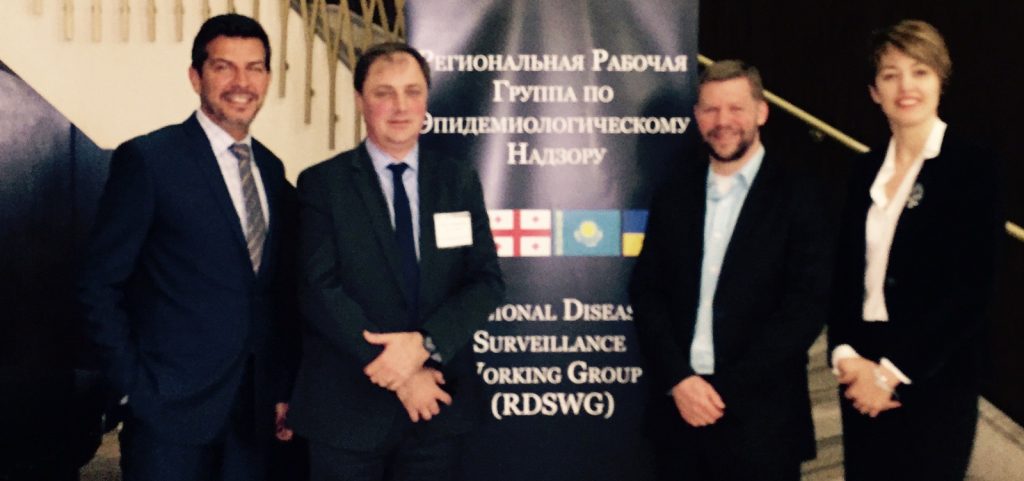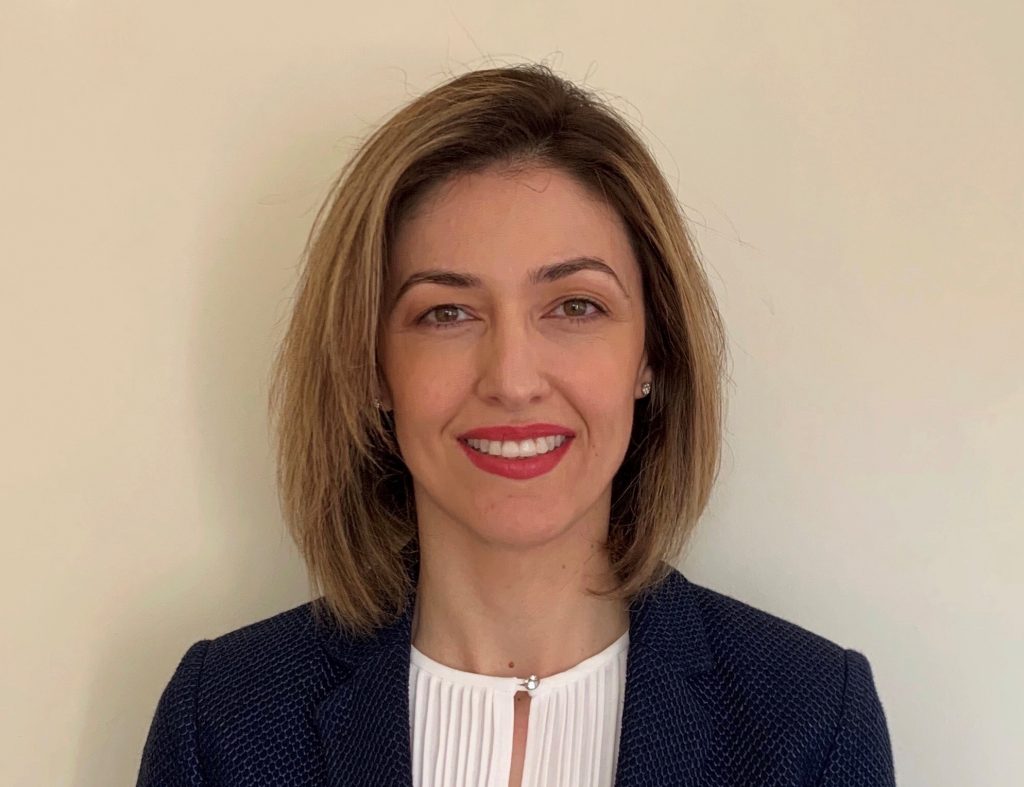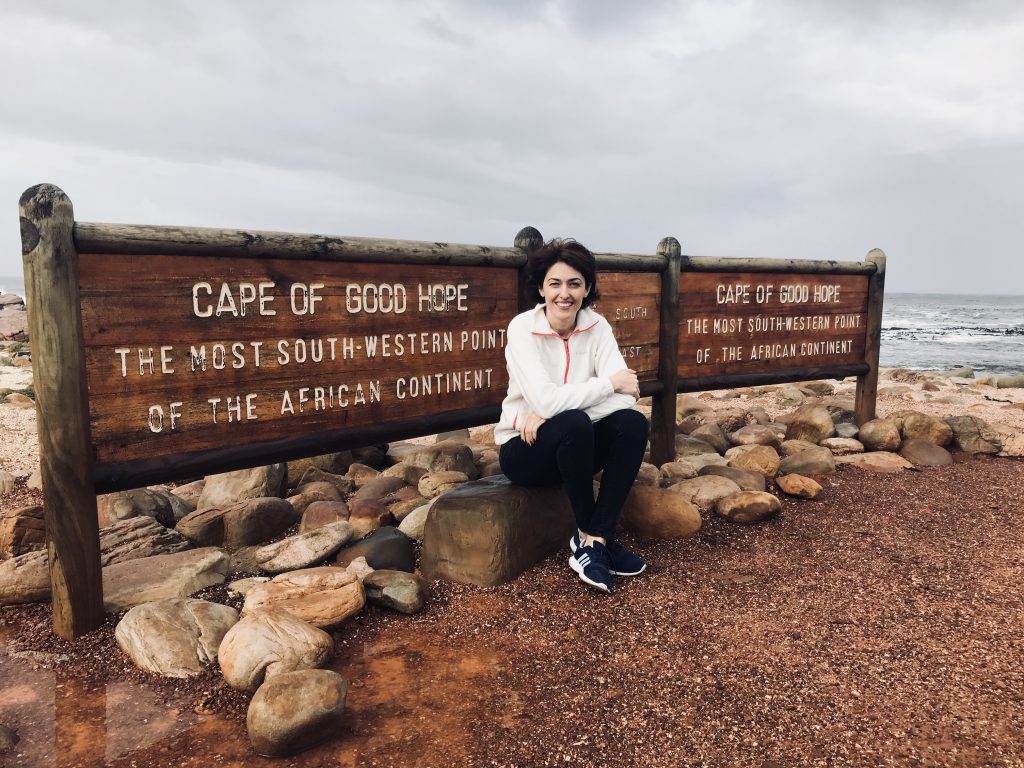Dr. Nino Kharaishvili, MD, MBA G'07: Combining Medicine and Business Acumen to Improve Health System Resilience
June 26, 2020 · 2020
Most of us didn’t see the COVID-19 pandemic until it was on top of us. Nino Kharaishvili, MD, saw it a mile away.
Maybe not COVID-19 specifically, but a global pandemic. “Anyone who works in global health and knows the conditions of health systems around the world could have predicted this was coming,” says Kharaishvili, principal of the Health System Resilience practice for Jacobs, an international technical, scientific and project delivery service provider and consultancy. Months before COVID-19 surfaced, Kharaishvili had been working on a health system resilience framework to help international organizations prepare for, withstand, and rebound from adverse healthcare events.
With her medical expertise, knowledge of healthcare systems, and experience in planning and strategy to counter biological threats on a global scale, Kharaishvili seems tailor-made to combat COVID-19. But, far from following a straight line, her career had taken a roundabout path that couldn’t have happened without her eagerness to embrace new opportunities. Much begins with her education at Saint Rose.
From MD to MBA to ‘now what?’
In 2004, Kharaishvili was a newly minted MD in her native Tbilisi, Georgia. She planned to become an ob/gyn specialist, but circumstances changed her path. Georgia, which became independent from the former Soviet Union in 1991, was reinventing its social and economic systems, including healthcare. Kharaishvili wanted to help.
“We had a lot of challenges, including how to set up the financing, the model of care,” she says. “It was a very critical moment in shaping the country’s healthcare system.”
Kharaishvili applied to the U.S. Department of State’s Edmund S. Muskie Graduate Fellowship Program, which sponsored students from certain countries of the former Soviet Union to study in the U.S. Her submission essay was about the influence of insurance and healthcare financing on the population’s health, and how synergistic the insurance schemes and models need to be in providing healthcare services to the population.
With the fellowship, she decided to earn an MBA. “The financing models were very foreign to me at the time, and I wanted to learn that component of business and see how I could bring it to the health system,” says Kharaishvili. She started at Saint Rose’s Huether School of Business in 2006. “I showed up in Albany, on my first trip to the U.S., with two suitcases and a little bit of cash.”
She found the MBA curriculum, so different from the MD, challenging and interesting. She loved the diversity of the U.S., traveling throughout the country whenever she could.
“Travel is the biggest eye-opener,” says Kharaishvili, who has since visited more than 50 countries. “Travel experiences change your outlook on many aspects of life and it is mind-expanding.”
After graduating, Kharaishvili worked for a medical manufacturer in New York City for a year and returned to Georgia in the spring of 2008 (Muskie fellows are required to return to their home countries for two years). A couple of months later, war broke out between Georgia and Russia.
“I was without a job, I was a single mom with a 5-year-old daughter, and my country was at war,” she adds. “I didn’t know what I was going to do.”
Kharaishvili heard through the Muskie grapevine that Booz Allen Hamilton was looking for a healthcare professional in Georgia who understood the laboratory system. That’s how she became a sustainability expert, advising the U.S. Department of Defense (DoD) on the Georgian healthcare system.

Dr. Nino Kharaishvili, MD, MBA (at far right) in 2016 with the Ukraine Deputy Minister of Health at that time and representatives of the Defense Threat Reduction Agency.
Saving the world from WMDs
Two years later, Booz Allen Hamilton won a major DoD contract under the Nunn-Lugar Cooperative Threat Reduction (CTR) Program, which partners with other nations to prevent the proliferation or use of weapons of mass destruction.
“They asked if I would be willing to come to the U.S. Being adventurous and a risk-taker, my daughter and I packed up our belongings and set out on our new life,” she says.”
Kharaishvili started as a clinical expert combating biothreats. “We were countering potential bioterror originating outside the U.S.,” she explains. “Our mandate was to improve health systems and detect, diagnose, and report the cases and outbreaks of infections caused by especially dangerous pathogens, or pathogens that could be weaponized.”
During her tenure with the program, the CTR’s biological portfolio grew to encompass 40 countries; Kharaishvili’s team ranged from 25 to 50 people.
“I was advising DoD on how to assess international health systems, design the different programs, and evaluate impact of progress made,” she says. “I was using the skills I had learned, like SWOT analysis and critical thinking and analysis, in medical school and the Saint Rose MBA program.” (Johns Hopkins Journal of Health Security will shortly publish two of her papers based on her work).
Kharaishvili marvels at how programs like the Muskie Fellowships have yielded immeasurable benefits to the global community.
“I’m helping the entire world with my thinking because I was given the platform and opportunity to come to U.S. and practice on a larger scale,” she says. “This kind of educational advancement is the best investment you can make, giving fellowship recipients the opportunity to break out of their small ponds and to use the invaluable experience gained to implement positive change and foster mutual understanding.”
The common thread: resilience
Fast forward to several months ago, shortly before the novel coronavirus surfaced. Kharaishvili had been collaborating with Jacobs on a resilience framework.
“The Health System Resilience framework is a combination of emergency preparedness, sustainability, training, infrastructure, and so forth, all in one pot,” she explains. “We look at the health systems holistically and improve the components to make it more resilient toward any shocks or adverse events it may encounter in the future.”
Kharaishvili joined Jacobs in March.
“As I was making the change, we had been talking about how we were woefully unprepared to withstand a pandemic or a bioterrorist threat. Then COVID-19 exploded – it was like a premonition,” she says.
She spent a total of three days in the company’s office before making the change to working remotely from her home in northern Virginia (near Washington, D.C.), sheltering in place with her daughter, who just graduated from high school.
Kharaishvili has quickly adapted to the new reality, which should surprise no one.
“Resilience is about being prepared, going through an adverse event, rebounding with minimal losses, and learning how to be better prepared,” she says. “Resilience is part of my life. Being resourceful and resilient is a hallmark of my entire career.”
By Irene Kim



